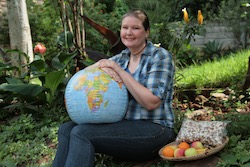WDI Alum: Changing Course from Assembly Line to Saving Lives
Thursday, February 18, 2016
Note: This is one in an ongoing series of articles profiling past WDI interns and Multidisciplinary Action Project (MAP) team members and their career paths. Additional profiles in the series may be found here.
With an engineering degree in hand, Patricia Griffin said she was probably destined for a job at an auto plant. But while studying for her MBA at Michigan’s Ross School of Business in 2009, she was part of a WDI-sponsored student team that traveled to a Ugandan hospital.

The experience changed her life – and the course of her career.
As part of the project, Griffin examined Kumi Hospital’s inventory management system and saw that it often ran out of life-saving drugs. She worked with the drug warehouse clerk on some basic supply chain management principles.
“In a matter of seven weeks, the hospital had stopped stocking out of essential medicines and patients stopped dying,” Griffin said. “At that point I realized my skill set was valuable and rare in this part of the world and I could either go back to the auto industry to eke out two seconds of additional productivity on an assembly line or return to Africa and save lives. The right choice was obvious to me.”
After earning her MBA, Griffin took a fellowship with LGT Venture Philanthropy working with Bridge International Academies in Kenya. She also oversaw operations at a nonprofit that partnered with local, smallholder farmers in Kenya to grow trees as a cash crop, and served as an adviser for more than a dozen health entrepreneurs in Kenya and Ethiopia for the global development firm Abt Associates. These work experiences helped Griffin discover where she could best contribute.
In 2014, she started her own company in Kenya – Inagape – that buys fruit from local farmers, dries it, packages it and then sells it as healthy snacks under the name Snak Afya. Its first product is a dried coconut snack food available at Nairobi stores. Plans are to add a flavored coconut snack food and possibly bottled coconut water.
Running her own startup business, Griffin often harkens back to her experience at Kumi Hospital.
As part of the Kumi project, Griffin and three of her fellow MBA students also worked with the staff at Kumi to cut costs so the facility wouldn’t run out of money at the end of each month.
The student team, part of Ross’ Multidisciplinary Action Projects (MAP) for MBA students, divided expenses into four categories – transport, food, medicine and medical supplies.
“We did a deep dive to see how the money was really being spent,” Griffin said. “At the end of seven weeks, we were able to make several recommendations on cost-saving initiatives and even implement some of the ideas.”
One example was that the hospital had two separate pharmacies serving outpatients and inpatients, but only one set of staff that had to walk about 50 yards between both. The hospital wanted to hire a second staff but the MAP team instead created one pharmacy with two service windows. The solution saved the hospital time and money by eliminating the need to hire more staff and making better use of the existing staff’s time.
When Griffin revisited the hospital in 2013, the two-window pharmacy was still in operation. “We’d spent our last weekend in Uganda executing that cost-saving recommendation, so seeing it still intact and functioning was affirming,” she said.
One of the lessons Griffin learned at Kumi was to ask questions and never assume anything. Like, for instance, why two pharmacies?
“I happened to ask why there were two pharmacy rooms in the first place and the answer I received was nothing I could’ve imagined,” Griffin said. “Apparently, during the Ugandan civil war, guerrilla groups would raid the hospital at gunpoint for medicines to treat wounded fighters in the field. When all the medicine was stocked in one room, the entire inventory would be stolen. Cleverly, by separating the pharmacy into two rooms, they’d only lose half their stock.”
That story stayed with her. She also reflects on the advice she received from the late C.K. Prahalad, one of her professors at the time, about working at the base of the pyramid. Prahalad encouraged her to sense an opportunity and then take the leap of faith “with both feet.”
“When the going gets tough and I feel like giving up or throwing in the towel, I think back to the number of sacrifices I’ve made to successfully switch careers,” she said. “I also re-read the encouraging note that Prahalad wrote to me on the bottom of my final essay for his class. It reminds me again why I wanted this career in the first place.”
And she thinks back to the lessons from that WDI MAP experience.
“Questioning my assumptions and taking nothing for granted has become a basic mode of operation for how I conduct my career and life,” Griffin said. “That’s a direct result of the MAP experience.”
